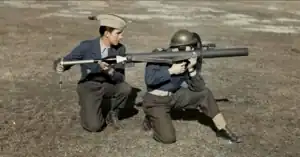| LRAC 73-50 | |
|---|---|
 French 73mm LRAC | |
| Type | Anti-tank rocket launcher |
| Place of origin | France |
| Service history | |
| Used by | France Israel[1] Morocco |
| Wars | Korean War First Indochina War Algerian War Six-day War Lebanese Civil War[2] |
| Production history | |
| Manufacturer | DEFA |
| Specifications | |
| Mass | 6.7 kg (14.7 lb) |
| Length | 1.2 m (3.9 feet) |
| Caliber | 73 mm |
| Rate of fire | 4 rounds per minute |
| Muzzle velocity | 170 m/s (557.7 ft/s) |
| Effective firing range | 200 m (656.2 feet) |
| Maximum firing range | 1,200 m (3,937 feet) |
| Filling | RDX/TNT[3] |
| Filling weight | 300 g (11 oz) |
| External image | |
|---|---|
| LRAC 73-50 | |
.tif.jpg.webp)
Moroccan troops with 73mm LRAC, 1960.
The LRAC de 73mm Mle 1950 (lance-roquettes antichar de 73 mm modèle 1950 (LRAC 73-50)) was a French antitank rocket launcher produced and fielded in the 1950s. The LRAC fired a 73 mm (2.9 in) high explosive antitank projectile that was capable of penetrating over 11 inches (280 mm) of rolled homogenous armor when struck at a 90-degree angle of impact.[4] The LRAC 73-50 was replaced in French service by the LRAC F1. Used during the Korean War for the French Battalion of the United Nations Organisation, it pierced the armor of T-34 tanks.
The LRAC 73-50 had a shield to protect the operator's face from the rocket's back-blast.[5]
References
- ↑ David Campbell (2016). Israeli Soldier vs Syrian Soldier : Golan Heights 1967–73. Combat 18. illustrated by Johnny Shumate. Osprey Publishing. p. 49. ISBN 9781472813305.
- ↑ Kassis, 30 Years of Military Vehicles in Lebanon (2003), p. 26.
- ↑ Bollendorf, p. 300.
- ↑ COMHART Volume 10, p. 66.
- ↑ "Musee Infanterie". musee-infanterie.com. Archived from the original on 19 October 2013. Retrieved 19 October 2013.
Bibliography
- Samer Kassis, 30 Years of Military Vehicles in Lebanon, Beirut: Elite Group, 2003. ISBN 9953-0-0705-5
- J. E. Stauff, J. Guillot, and R. Dubernet, Comité pour l'histoire de l'armement terrestre (COMHART) Tome 10 Armements Antichars Missiles Guidés et Non Guidés, Délégué Général pour l'Armement, 1996
- John Bollendorf, ST-CW-07-29-74 Projectile Fragment Identification Guide Foreign, Defense Intelligence Agency, Washington: GPO, 31 December 1973 (DIA Guide)
This article is issued from Wikipedia. The text is licensed under Creative Commons - Attribution - Sharealike. Additional terms may apply for the media files.